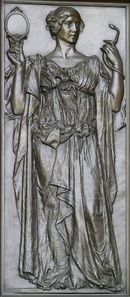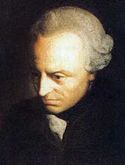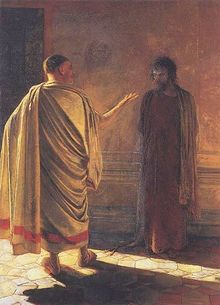حقيقة
الحقيقة truth في اللغة هي ما أُقر في الاستعمال على أصل وضعه، والمجاز ما كان بضد ذلك، وحقيقة الشيء خالصه وكنهه ومحضه وحقيقة الأمر يقين شأنه، أي «ما يصير إليه حق الأمر ووجوبه». وهي أخيراً الحرمة أو الغناء أو ما يلزم حفظه ومنعه.
وتنطوي الحقيقة في الفلسفة على عدة معان:
- الأول: هو مطابقة التصور أو الحكم للواقع، أي تطابق الفكر مع الأشياء، أو تطابق المعرفة مع موضوع المعرفة (كَنْت). وقد تطلق الحقيقة على الشيء الثابت قطعاً ويقيناً، كالقول: «هذه الشهادة مطابقة للحقيقة»، أو «الحقيقة التاريخية».
- الثاني: هو مطابقة الشيء لصورة نوعه، أو لمثاله الذي أريد له، فالحقيقة بهذا المعنى هي ما يصير إليه حق الشيء ووجوبه، كالقول: «هذه الصورة مطابقة للحقيقة»، بمعنى أنها بلغت الغاية في التعبير عن الشيء.
- الثالث: هو الماهية أو الذات، فحقيقة الشيء ما به الشيء هو باعتبار تحققه حقيقة، كموجود وكائن؛ وباعتبار تشخصه هوية، فلكل شيء ماهية هو بها ما هو، وهي حقيقته بل ذاته: كالحيوان الناطق للإنسان، فحقيقة الوجود ماهيته، وحقيقة إنية الموجود مادته وصورته. وطريق المعرفة به معرفة علله (أرسطو)، وحقيقة الجسم جوهره أي امتداده لا أعراضه المتغيرة (ديكارت)، وحقيقة ماهية الإنسان مجموع علاقاته الاجتماعية (ماركس).
- الرابع: هو مطابقة الحكم للمبادئ العقلية، أي الحقائق الأولية.
في الفلسفة
والحقيقة عند أرسطو هي علم الوجود من حيث هو وجود حق، أي الفلسفة بوصفها علم الحقيقة. وعند البراگماتيين pragmatists هي الفكرة الناجحة أو النافعة أو الفرضية العلمية التي تحققها التجربة.
والحقيقة عند الماركسيين هي الانعكاس الصادق الصحيح للواقع في الفكر، أي مطابقة الفكرة للشيء، أو هي المعرفة المعبرة عن الموجود الموضوعي. أما عند الوجوديين فالحقيقة هي تجلّي الواقع للمدرك، بحيث يتصور الشيء بحرية تامة وإرادة حرة. وتتخذ الحقيقة عند المتصوفين ثلاثة أصناف: الأولى حقيقة مطلقة، فعالة واحدة واجبة الوجود بذاتها، وهي حقيقة الله، والثانية حقيقة مقيدة، منفعلة، تصدر عن المطلقة بالفيض والتجلي، وهي العالم؛ والثالثة حقيقة أحدية جامعة بين المطلق والتقيد، الفعل واللاانفعال (الله والعالم).

أنواع الحقيقة
الحقيقة الصورية formal
وهي اتفاق العقل مع نفسه بلا تناقض، وهي موضوع المنطق الصوري.
الحقيقة المادية material
وهي اتفاق العقل مع الشيء الواقعي مادياً كان أو نفسيّاً، كالحقيقة الفيزيائية والحقيقة النفسية، وهي ما تتناوله العلوم التجريبية.

الحقيقة الواقعية real
وهي الوجود ذهنياً كان أو عينياً، كأن يقال: إن للعالم الخارجي حقيقة واقعية، أي وجوداً مستقلاً عن وجود المدرك.
الحقيقة الأبدية Perpetual أو السرمدية eternal
وهي مرادفة للحقيقة المطلقة absolute في الميتافيزيقة (الدين). وتعني المبادئ أو القوانين المطلقة المحيطة بجميع الموجودات، والتي تفيض عن العقل الإلهي، وتنعكس على العقل الإنساني، فتقربه من الله، وهي حقائق لا تقبل التفنيد.
الحقيقة المطلقة absolute
وتعني المعرفة الكاملة والشاملة بالواقع التي لا يمكن دحضها مستقبلاً.
الحقيقة النسبية relative
وتعني الحقيقة العلمية، وهي لا تعطي معرفة كاملة بالموضوعات التي تدرسها، لأنها مشروطة في كل مرحلة من مراحل تطورها بالمستوى الذي أنجزه العلم والتكنولوجية، فتتغير بتغير فروضها ومفاهيمها وبراهينها في سبيل بلوغ أكبر قدر من الدقة والكمال.
الحقيقة الموضوعيةobjective
هي المعرفة الإنسانية الذي لا يتوقف محتواها على إرادة الذات ورغبتها، بل تتحدد الحقيقة بمحتوى الشيء المنعكس ليحدد موضوعيتها.
الحقيقة الدينية religious
وهي الحقيقة الإيمانية البرهانية (وجود الله - الخلق)، أو غير البرهانية (عقيدة التثليث، التجسد) (الإكويني وغيره).
انظر ايضاً
- Aletheia
- Asha
- Belief
- Confirmation holism
- Contextualism
- Contradiction
- Degrees of truth
- Disposition
- Eclecticism
- Imagination
- Independence
- Interpretation
- Invariance
- Lie
- Lie-to-children
- List of fallacies
- Normative science
- Perspectivism
- Physical symbol system
- Public opinion
- Relativism
- Religious truth
- Slingshot argument
- Statistical independence
- Tautology (logic)
- Tautology (rhetoric)
- Truthiness
- Truthlikeness
- Two truths doctrine
- Unity of the proposition
- Verisimilitude
- Veritas
- What is truth?
Major theorists
|
ملاحظات
المصادر
- Aristotle, "The Categories", Harold P. Cooke (trans.), pp. 1–109 in Aristotle, Volume 1, Loeb Classical Library, William Heinemann, London, UK, 1938.
- Aristotle, "On Interpretation", Harold P. Cooke (trans.), pp. 111–179 in Aristotle, Volume 1, Loeb Classical Library, William Heinemann, London, UK, 1938.
- Aristotle, "Prior Analytics", Hugh Tredennick (trans.), pp. 181–531 in Aristotle, Volume 1, Loeb Classical Library, William Heinemann, London, UK, 1938.
- Aristotle, "On the Soul" (De Anima), W. S. Hett (trans.), pp. 1–203 in Aristotle, Volume 8, Loeb Classical Library, William Heinemann, London, UK, 1936.
- Audi, Robert (ed., 1999), The Cambridge Dictionary of Philosophy, Cambridge University Press, Cambridge, UK, 1995. 2nd edition, 1999. Cited as CDP.
- Baldwin, James Mark (ed., 1901–1905), Dictionary of Philosophy and Psychology, 3 volumes in 4, Macmillan, New York, NY.
- Baylis, Charles A. (1962), "Truth", pp. 321–322 in Dagobert D. Runes (ed.), Dictionary of Philosophy, Littlefield, Adams, and Company, Totowa, NJ.
- Benjamin, A. Cornelius (1962), "Coherence Theory of Truth", p. 58 in Dagobert D. Runes (ed.), Dictionary of Philosophy, Littlefield, Adams, and Company, Totowa, NJ.
- Blackburn, Simon, and Simmons, Keith (eds., 1999), Truth, Oxford University Press, Oxford, UK. Includes papers by James, Ramsey, Russell, Tarski, and more recent work.
- Chandrasekhar, Subrahmanyan (1987), Truth and Beauty. Aesthetics and Motivations in Science, University of Chicago Press, Chicago, IL.
- Chang, C.C., and Keisler, H.J., Model Theory, North-Holland, Amsterdam, Netherlands, 1973.
- Chomsky, Noam (1995), The Minimalist Program, MIT Press, Cambridge, MA.
- Church, Alonzo (1962a), "Name Relation, or Meaning Relation", p. 204 in Dagobert D. Runes (ed.), Dictionary of Philosophy, Littlefield, Adams, and Company, Totowa, NJ.
- Church, Alonzo (1962b), "Truth, Semantical", p. 322 in Dagobert D. Runes (ed.), Dictionary of Philosophy, Littlefield, Adams, and Company, Totowa, NJ.
- Clifford, W.K. (1877), "The Ethics of Belief and Other Essays". (Prometheus Books, 1999), infidels.org
- Dewey, John (1900–1901), Lectures on Ethics 1900–1901, Donald F. Koch (ed.), Southern Illinois University Press, Carbondale and Edwardsville, IL.
- Dewey, John (1932), Theory of the Moral Life, Part 2 of John Dewey and James H. Tufts, Ethics, Henry Holt and Company, New York, NY, 1908. 2nd edition, Holt, Rinehart, and Winston, 1932. Reprinted, Arnold Isenberg (ed.), Victor Kestenbaum (pref.), Irvingtion Publishers, New York, NY, 1980.
- Dewey, John (1938), Logic: The Theory of Inquiry (1938),Holt and Company, New York, NY. Reprinted, John Dewey, The Later Works, 1925–1953, Volume 12: 1938, Jo Ann Boydston (ed.), Southern Illinois University Press, Carbondale and Edwardsville, IL, 1986.
- Field, Hartry (2001), Truth and the Absence of Fact, Oxford University Press, Oxford, UK.
- Foucault, Michel (1997), Essential Works of Foucault, 1954–1984, Volume 1, Ethics: Subjectivity and Truth, Paul Rabinow (ed.), Robert Hurley et al. (trans.), The New Press, New York, NY.
- Garfield, Jay L., and Kiteley, Murray (1991), Meaning and Truth: The Essential Readings in Modern Semantics, Paragon House, New York, NY.
- Gupta, Anil (2001), "Truth", in Lou Goble (ed.), The Blackwell Guide to Philosophical Logic, Blackwell Publishers, Oxford, UK.
- Haack, Susan (1993), Evidence and Inquiry: Towards Reconstruction in Epistemology, Blackwell Publishers, Oxford, UK.
- Habermas, Jürgen (1976), "What Is Universal Pragmatics?", 1st published, "Was heißt Universalpragmatik?", Sprachpragmatik und Philosophie, Karl-Otto Apel (ed.), Suhrkamp Verlag, Frankfurt am Main. Reprinted, pp. 1–68 in Jürgen Habermas, Communication and the Evolution of Society, Thomas McCarthy (trans.), Beacon Press, Boston, MA, 1979.
- Habermas, Jürgen (1990), Moral Consciousness and Communicative Action, Christian Lenhardt and Shierry Weber Nicholsen (trans.), Thomas McCarthy (intro.), MIT Press, Cambridge, MA.
- Habermas, Jürgen (2003), Truth and Justification, Barbara Fultner (trans.), MIT Press, Cambridge, MA.
- Hegel, Georg, (1977), Phenomenology of Spirit, Oxford University Press, Oxford, UK, ISBN 0-19-824597-1.
- Horwich, Paul, (1988), Truth, 2nd edition, Oxford University Press, Oxford, UK.
- James, William (1904), A World of Pure Experience.
- James, William (1907), Pragmatism, A New Name for Some Old Ways of Thinking, Popular Lectures on Philosophy, Longmans, Green, and Company, New York, NY.
- James, William (1909), The Meaning of Truth, A Sequel to 'Pragmatism', Longmans, Green, and Company, New York, NY.
- James, William (1912), Essays in Radical Empiricism. Cf. Chapt. 3, "The Thing and its Relations", pp. 92–122.
- Kant, Immanuel (1800), Introduction to Logic. Reprinted, Thomas Kingsmill Abbott (trans.), Dennis Sweet (intro.), Barnes and Noble, New York, NY, 2005.
- Kirkham, Richard L. (1992), Theories of Truth, MIT Press, Cambridge, MA.
- Kneale, W., and Kneale, M. (1962), The Development of Logic, Oxford University Press, London, UK, 1962. Reprinted with corrections, 1975.
- Kreitler, Hans, and Kreitler, Shulamith (1972), Psychology of the Arts, Duke University Press, Durham, NC.
- Le Morvan, Pierre (2004), "Ramsey on Truth and Truth on Ramsey", British Journal for the History of Philosophy, 12 (4) 2004, 705–718, PDF.
- Peirce, C.S., Bibliography.
- Peirce, C.S., Collected Papers of Charles Sanders Peirce, vols. 1–6, Charles Hartshorne and Paul Weiss (eds.), vols. 7–8, Arthur W. Burks (ed.), Harvard University Press, Cambridge, MA, 1931–1935, 1958. Cited as CP vol.para.
- Peirce, C.S. (1877), "The Fixation of Belief", Popular Science Monthly 12 (1877), 1–15. Reprinted (CP 5.358–387), (CE 3, 242–257), (EP 1, 109–123). Eprint.
- Peirce, C.S. (1901), "Truth and Falsity and Error" (in part), pp. 718–720 in J.M. Baldwin (ed.), Dictionary of Philosophy and Psychology, vol. 2. Reprinted, CP 5.565–573.
- Polanyi, Michael (1966), The Tacit Dimension, Doubleday and Company, Garden City, NY.
- Quine, W.V. (1956), "Quantifiers and Propositional Attitudes", Journal of Philosophy 53 (1956). Reprinted, pp. 185–196 in Quine (1976), Ways of Paradox.
- Quine, W.V. (1976), The Ways of Paradox, and Other Essays, 1st edition, 1966. Revised and enlarged edition, Harvard University Press, Cambridge, MA, 1976.
- Quine, W.V. (1980 a), From a Logical Point of View, Logico-Philosophical Essays, 2nd edition, Harvard University Press, Cambridge, MA.
- Quine, W.V. (1980 b), "Reference and Modality", pp. 139–159 in Quine (1980 a), From a Logical Point of View.
- Rajchman, John, and West, Cornel (ed., 1985), Post-Analytic Philosophy, Columbia University Press, New York, NY.
- Ramsey, F.P. (1927), "Facts and Propositions", Aristotelian Society Supplementary Volume 7, 153–170. Reprinted, pp. 34–51 in F.P. Ramsey, Philosophical Papers, David Hugh Mellor (ed.), Cambridge University Press, Cambridge, UK, 1990.
- Ramsey, F.P. (1990), Philosophical Papers, David Hugh Mellor (ed.), Cambridge University Press, Cambridge, UK.
- Rawls, John (2000), Lectures on the History of Moral Philosophy, Barbara Herman (ed.), Harvard University Press, Cambridge, MA.
- Rorty, R. (1979), Philosophy and the Mirror of Nature, Princeton University Press, Princeton, NJ.
- Russell, Bertrand (1912), The Problems of Philosophy, 1st published 1912. Reprinted, Galaxy Book, Oxford University Press, New York, NY, 1959. Reprinted, Prometheus Books, Buffalo, NY, 1988.
- Russell, Bertrand (1918), "The Philosophy of Logical Atomism", The Monist, 1918. Reprinted, pp. 177–281 in Logic and Knowledge: Essays 1901–1950, Robert Charles Marsh (ed.), Unwin Hyman, London, UK, 1956. Reprinted, pp. 35–155 in The Philosophy of Logical Atomism, David Pears (ed.), Open Court, La Salle, IL, 1985.
- Russell, Bertrand (1956), Logic and Knowledge: Essays 1901–1950, Robert Charles Marsh (ed.), Unwin Hyman, London, UK, 1956. Reprinted, Routledge, London, UK, 1992.
- Russell, Bertrand (1985), The Philosophy of Logical Atomism, David Pears (ed.), Open Court, La Salle, IL.
- Schopenhauer, Arthur, (1974), On the Fourfold Root of the Principle of Sufficient Reason, Open Court, La Salle, IL, ISBN 0-87548-187-6.
- Smart, Ninian (1969), The Religious Experience of Mankind, Charles Scribner's Sons, New York, NY.
- Tarski, A., Logic, Semantics, Metamathematics: Papers from 1923 to 1938, J.H. Woodger (trans.), Oxford University Press, Oxford, UK, 1956. 2nd edition, John Corcoran (ed.), Hackett Publishing, Indianapolis, IN, 1983.
- Wallace, Anthony F.C. (1966), Religion: An Anthropological View, Random House, New York, NY.
- Reference works
- Audi, Robert (ed., 1999), The Cambridge Dictionary of Philosophy, Cambridge University Press, Cambridge, UK, 1995. 2nd edition, 1999. Cited as CDP.
- Blackburn, Simon (1996), The Oxford Dictionary of Philosophy, Oxford University Press, Oxford, UK, 1994. Paperback edition with new Chronology, 1996. Cited as ODP.
- Runes, Dagobert D. (ed.), Dictionary of Philosophy, Littlefield, Adams, and Company, Totowa, NJ, 1962.
- Webster's New International Dictionary of the English Language, Second Edition, Unabridged (1950), W.A. Neilson, T.A. Knott, P.W. Carhart (eds.), G. & C. Merriam Company, Springfield, MA. Cited as MWU.
- Webster's Ninth New Collegiate Dictionary (1983), Frederick C. Mish (ed.), Merriam–Webster Inc., Springfield, MA. Cited as MWC.
وصلات خارجية
| Truth
]].- An Introduction to Truth by Paul Newall, aimed at beginners.
- Stanford Encyclopedia of Philosophy:
- Heidegger on Truth (Aletheia) as Unconcealment
- History of Truth: The Greek "Aletheia"
- History of Truth: The Latin "Veritas"



